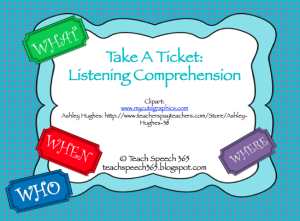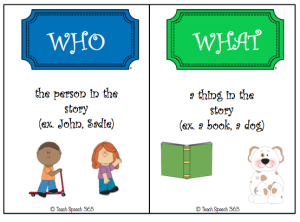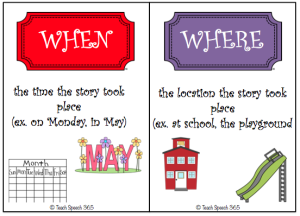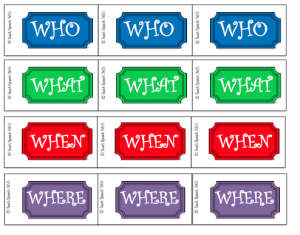Listen Up! Take A Ticket!
I’m constantly trying to find fresh ways to target listening comprehension, since most of my students need practice with this skill. It can be one of the “less fun” areas for kids to work on. I found some cute ticket clipart from Ashley Hughes on TpT and decided to put it to good use.
Take A Ticket Listening Comprehension was born:
First, you get visual aids for reminders on 4 types of WH questions (who, what, where, when):
Print a copy of the “tickets.” If you have a larger group, I’d suggest printing 2-3 copies of this page. Once cut/laminated, place the tickets in a container.
Students listen to a story (there are 24 total) and take turns drawing a ticket. The ticket they draw will be the type of question they have to answer! For example, if the student draws a purple ticket, the SLP asks the “where” question. If the student answers correctly, he/she keeps the ticket. Whoever has the most tickets at the end wins!
Each story is 4 sentences long and the questions/answers are right on the card:
Students will have to be listening carefully to each story. Then they will have to make sure they are answering the correct type of WH question. I hope you enjoy this listening comprehension activity with a twist!
Get it HERE!
Enter to win a copy below:






I use avariety of apps and reading passages to target listening comprehension
I use a variety of reading passages, TPT materials, and apps to target listening comprehension skills
Cute idea to spruce up listening comp exercises
I love the No Glamour Auditory Processing cards by LinguiSystems
i have many different activities including a book that goes from one to four sentences with questions
I start by using simple sentences. I have the child listen and I ask a ?. For example “The boy had a red ball. What color ball did the boy have?” And then I work up (or down) from there. If that is too difficulty I take out the modifier “The boy has a ball. What does the boy have?”.
I always use visuals for comprehension. Students who struggle with this usually need some kind of visual or tactile cue.
I generally begin at sentence level with visual support and build up a sentence at a time before using easy readers.
I have been using A Metacognitive Program for Auditory Processing (I think that’s the name!) with several of my students. I like it so far.
I use simple sentences and also i use short passages depending on their grade from Readworks.
I use a book that has short stories and a large picture prompt. Each story comes with 10 questions.
I use short stories with picture prompts.